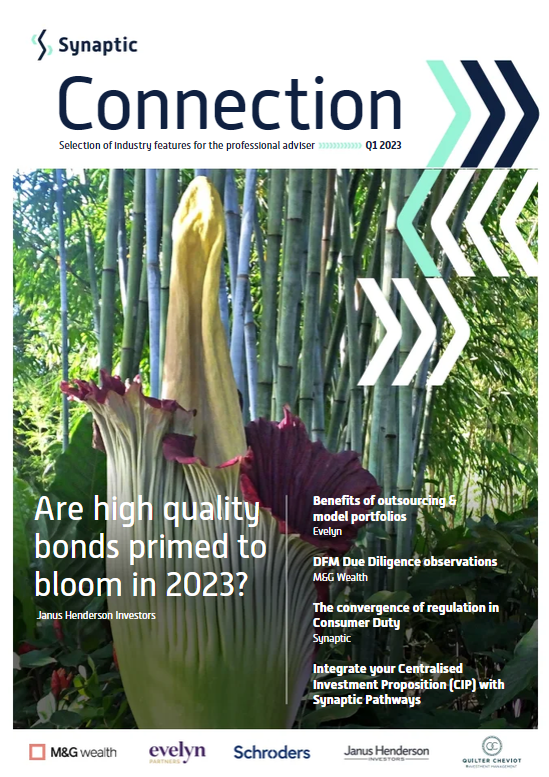In this edition...
- What we know – and what we don’t Patrick Farrell, Chief Investment Officer and Head of Research - Charles Stanley
- Regime shift: five seismic adjustments taking place in the global economy Azad Zangana, Senior European Economist and Strategist - Schroders
- How to navigate a recession Mike Coop, Morningstar Investment Management - EMEA
- High quality bonds are primed to bloom in 2023 John Pattullo, Co-Head of Global Bonds- Janus Henderson
- Fixed Income - Research Matters Andrew Metcalf, Fixed Income Portfolio Manager - Close Brothers Asset Management
- From 'TINA to 'TANIA'... Bryn Jones, Head of Fixed Income - Rathbones
- The RSMR Broadcast: How impactful is investment management outsourcing? Scott McNiven, MPS Accounts Manager - RSMR
- Hours to minutes Synaptic,
- Benefits of outsourcing and model portfolios Evelyn & Partners,
- DFM Due Diligence – some observations Sean Hawkins, Head of Business Development - M&G Wealth Investments
- 2022 – The death knell for the 60/40 approach to investing? John Husselbee, Head of Multi-Asset - Liontrust
- Why ‘nature positive’ will be as big as net zero Jenn-Hui Tan, Global Head of Stewardship & Sustainable Investing - Fidelity International
- The rise of the female investor Vanessa Eve, Investment Manager - Quilter Cheviot
- Integrate your Centralised Investment Proposition (CIP) with Synaptic Pathways Eric Armstrong, Client Director - Synaptic
- The convergence of regulation in Consumer Duty Eric Armstrong, Client Director, Synaptic
- Tackle Consumer Duty with the new Synaptic integration Alan Lakey , Director - CIExpert & Highclere Financial Services Ltd
 Financial advisers are accustomed to scrutiny: from Know Your Customer to Treating Customers Fairly, they have long had to prove that they are acting in the best interests of clients. However, this scrutiny is likely to move up a gear over the next 12 months, as consumer duty rules, a cost-of-living crisis and weakening financial market returns collide.
Financial advisers are accustomed to scrutiny: from Know Your Customer to Treating Customers Fairly, they have long had to prove that they are acting in the best interests of clients. However, this scrutiny is likely to move up a gear over the next 12 months, as consumer duty rules, a cost-of-living crisis and weakening financial market returns collide.
Consumer Duty will be increasingly familiar to advisers. It requires firms to demonstrate that they have delivered good outcomes for retail customers. This, says the FCA, means they need to “act in good faith, avoid causing foreseeable harm, and enable and support customers to pursue their financial objectives.” 1
Compliance with Consumer Duty is becoming a reality and is likely to place new requirements on advisers to evidence the value for money they deliver to clients. They will need to show clearly that they are improving customer outcomes for the fee they charge.
In November, Therese Chambers, Director of Consumer Investments at the FCA, said: “We are constantly challenging firms to consider their current practices through the lens of the Consumer Duty – I cannot emphasise enough that this is a different lens to what (advisers) have been used to and even though the rules are not yet in force it requires active participation to understand the degree and extent of the cultural shift that it entails. A tick-box approach to detailed regulatory requirements will simply not be good enough as that will never be sufficient to answer the question of whether a firm has secured good outcomes for its customers.” 2
The FCA says advisers need to show how they are monitoring investments, assessing new and emerging risks, any actions taken to address those risks and an assessment of whether the firm’s business strategy is consistent with delivering good outcomes. This may not be easy when, after the initial set-up costs, many clients in the accumulation phase may not require a significant amount of financial planning with the advisers’ role focused more on encouraging clients to make regular contributions into ISAs and SIPPs.
Shifting markets
The market environment is compounding the problem. In recent years, market beta has done the hard work on investor returns. However, as economic growth slows, inflation and interest rates rise, markets are unlikely to provide a tailwind. At the same time, the world is facing some significant global challenges – climate change, deglobalisation, geopolitical tensions – and investment solutions need to be nimble and responsive.
In recent years, passive 60/40 solutions have been a good option. Investors watching their portfolios tick higher were unlikely to ask too many questions. However, this may change as markets become more complicated and volatile. These ‘cheap’ solutions may start to struggle because they don’t have the flexibility to respond to a changing market environment.
Against this backdrop, advisers need to be prepared for some self-analysis, particularly if they are running their own model portfolio services. There are likely to be new requirements to evidence price and value for those portfolios, and the requirements may be very different to those for a firm adopting a packaged investment solution. Firms will need to show consistency in the way they assess different pricing and service models within their investment propositions.
Equally, advisers need to be prepared for an increase in their already-onerous administrative burden. They will need a revised approach of all the proof points, and the new areas they need to document.
Flexibility, but consistency
How can advisers give themselves the best possible chance of meeting regulatory and client expectations in this new environment? Advisers need to be wary of one-size-fits-all solutions, which may draw the attention of the regulator. Advisers need a clear investment philosophy and process, but it should lead to different outcomes. They will also need to demonstrate that their solutions are sufficiently flexible to meet changing client needs and adapt to shifting financial market environments.
Outsourcing investment management responsibility can help, particularly with consistency of outcomes. It means an adviser can go on a holiday without worrying about their client portfolios while they are away. They don’t have to divert their attention from their business because markets are volatile, or an investment has gone wrong. An appointed investment management firm will have broader resources, ensuring that there are dedicated investment managers always working on client portfolios.
However, outsourcing is not a panacea. Advisers will need to ensure the solutions they choose have embedded flexibility. That may mean using a handful of providers that can offer a broader range of services. We believe that active management – dynamic asset allocation and careful security selection – will be important in the years ahead. Picking the lowest cost alternative could prove a false economy.
At Evelyn Partners, we have three types of Model Portfolio Services designed to suit the needs of different investors.
For the price sensitive investor, our Core Managed Portfolio Service is managed using a blend of active and passive funds with lower OCFs and additionally offers an element of downside protection. For the more experienced investor where the need for greater diversity is important, our Active Managed Portfolio Service uses assets beyond the traditional basket of collectives and so offer investors a greater potential return over the longer term. Finally, investors keen to ensure their money is only invested in companies with an awareness of the environmental, social and governance criteria we offer a range of Sustainable managed portfolios.
Advisers can use our services flexibly, as a full-service solution, or mix-and-match.
The next 12 months may bring increasing challenges for financial advisers, and they may have to re-examine their approach to investment selection and monitoring. However, there are compelling options already out there that may offer a solution for this new environment.
Get in touch
Mark Coles
Business Development Director – Head of National Accounts
This article is solely for professional advisers and should not be construed as investment advice.
The value of investments can go down as well as up and investors may not get back the amount invested. Whilst considerable care has been taken to ensure the information contained within this article is accurate and up-to-date, no warranty is given as to the accuracy or completeness of any information and no liability is accepted for any errors or omissions in such information or any action taken on the basis of this information.
Issued by Evelyn Partners Investment Management Services Limited, authorised and regulated by the Financial Conduct Authority.
1https://www.fca.org.uk/firms/consumer-duty
2https://www.fca.org.uk/news/speeches/key-priorities-financial-advice-industry
Sign up for updates
Keep up to speed with everything you need to know each quarter, by email or post.

